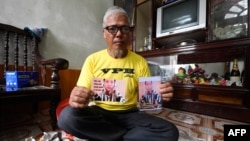Vietnam’s death penalty and alleged use of torture to force confessions is in the spotlight after the People’s Court in northern Haiphong last month notified the family of death-row prisoner Nguyen Van Chuong that his execution was imminent.
Chuong’s case exemplifies rights groups’ objections to human rights abuses in Vietnam's criminal justice system, particularly allegations of torture, forced confessions, and the country's status as the biggest executioner in Southeast Asia.
Vietnam is notoriously secretive on the death penalty but according to a 2017 Amnesty International report, 429 people were executed in Vietnam between 2013 and 2016, which would give Vietnam the third-highest number of executions in the world.
In 2007, Chuong was accused and convicted of robbery and killing a police officer and was sentenced to death. He has maintained his innocence for the past 16 years and alleged he was tortured into confession. Chuong said in letters to his family that he was stripped naked, hung and beaten during police interrogation, according to an Amnesty International report.
Authorities have denied Chuong's allegations of torture.
On August 4, Chuong's family was notified by the People's Court of Hai Phong City that his execution was imminent, although a set date was not given.
Chuong’s family and 13 human rights groups are calling on the Vietnamese government to halt Chuong’s execution.
On August 9, the International Commission of Jurists and 12 other human rights groups sent an open letter to Vietnamese President Vo Van Thuong.
"We, the undersigned organizations, are writing to express our deep concern over the apparently impending execution of death row prisoner Mr. Nguyen Van Chuong," the letter reads. "We request that you and the responsible authorities ensure the execution is halted immediately and that you initiate a prompt, impartial and effective investigation into allegations that he was tortured to compel him to 'confess' guilt."
Chuong’s mother, Nguyen Thi Bich, wrote a plea to Communist Party officials on August 29.
“My family has been asking for justice for many years for my son - Nguyen Van Chuong. For the past 17 years, no agency has responded,” Bich wrote in Vietnamese in a letter shared with VOA by a Vietnamese journalist who is in contact with Chuong’s family and asked for anonymity for safety reasons.
“If this were your son, and he was falsely accused like this, what would you think? I hope you will reinvestigate this unjust case of my child,” Bich added.
Flawed justice system
Experts say Chuong's alleged treatment mirrors what many individuals face in Vietnam's criminal justice system: lack of access to a fair trial, and torture by the police.
Chuong's connection to the crime is based primarily on the "weak evidence" of his forced confession and efforts to clear his name have been suppressed, said Ho Chi Minh City lawyer Le Cong Dinh, himself a former prisoner.
Several individuals in Chuong’s village claim to have seen him at the time of the murder 40 kilometers away from the crime scene. Those who have brought this to police attention have been threatened and beaten, according to local media reports. Chuong’s brother, Nguyen Trong Doan, was also sent to prison on allegations of manipulating witnesses and evidence after trying to exonerate his brother, as stated in a report in the independent publication The Vietnamese.
Beyond Chuong’s case, flaws are rife in the justice system and beating suspects is the norm, said Dinh, who spent five years in prison for “attempts to overthrow the state” after defending high-profile human rights cases.
“The investigators in Vietnam use it all the time. I don't say most of the time – all of the time. They use torture against the accused and the suspects in custody,” Dinh said. He added that police investigators also often force suspects into incriminating themselves by posing for photos and videos that are later used as evidence.
Human Rights Watch Deputy Asia Director Phil Robertson said he shares concern over the use of torture.
“Police frequently use beatings and torture as part of their investigative techniques, especially during pre-trial detention when they are trying to pressure criminal suspects to confess to crimes,” Robertson wrote in an email.
“While I can’t say for certain if this is what happened to Nguyen Van Chuong, I would not be surprised to find those allegations have merit,” he wrote.
Nguyen Ngoc Nhu Quynh, heard about police abuse while in jail herself. Fellow prisoners told Quynh about beatings while she served time for “spreading anti-state propaganda” after blogging extensively on human rights topics.
“When I was doing my sentence, every night I listened to the stories from the other prisoners,” said Quynh, who spoke to VOA from the U.S. where she was granted political asylum in 2018.
“They told me everything about the way that the police beat people in the prison,” said Quynh, who now lives in the U.S. state of Texas.
Death penalty
The announcement of his impending execution raises the stakes for Chuong and many other Vietnamese prisoners facing the death penalty and is bringing international attention to Vietnam’s high number of executions.
Robertson said allegations of forced confessions mean many innocent people could be killed.
“The Vietnamese police’s regular use of torture on criminal suspects creates great risks for miscarriages of justice through people confessing to crimes they did not commit,” he said. “Imposition of the death penalty makes those failures of the criminal justice system profoundly unjust and deadly.”
In an August 10 statement, the diplomatic missions to Vietnam from the EU, Canada, Norway and the United Kingdom called on the Vietnamese authorities to halt Chuong’s execution and criticized the country’s use of the death penalty more broadly.
“We strongly oppose the use of capital punishment at all times and in all circumstances, which is a cruel, inhuman and degrading punishment and can never be justified, and advocate for Vietnam to adopt a moratorium on all executions,” the statement read.





